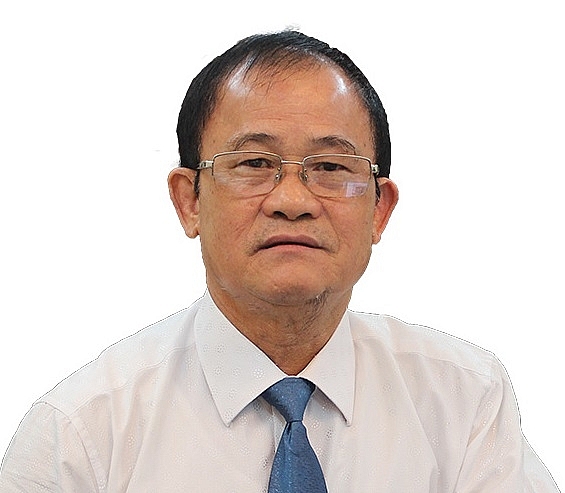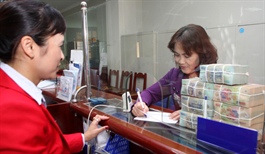Increasing economic capacity for healthier credit
Increasing economic capacity for healthier credit
Vietnam’s capital market stands at an oversupply even as deposit interest rates remains very low, with output interest rates decreasing sharply compared to previous years. Dr. Nguyen Dai Lai, former deputy director of the State Bank of Vietnam’s Banking Development Strategy Department, analyses the current capital market and predicts the development for the rest of the year.

Dr. Nguyen Dai Lai, former deputy director of the State Bank of Vietnam’s Banking Development Strategy Department
|
Amid the ongoing health crisis, the banking sector has not met the needs for affordable capital, though it is the industry that should provide funding sources to help businesses to step-by-step overcome bad debt and contribute to stabilise the nation’s economy.
In the first nine months of the year, market interest rates have decreased markedly due to the increase in liquidity that credit institutions experienced thanks to the State Bank of Vietnam’s (SBV) measures to further reduce interest rates.
As of October 1, the SBV adjusted management interest rates the third time since the beginning of the year. Accordingly, the refinancing rate decreased from 4.5 to 4 per cent, the bank or discount rate reduced from 3 to 2.5 per cent, and rates for overnight lending and loans to offset capital shortages in payment clearances decreased from 5.5 to 5 per cent, among others.
In addition, the SBV also issued a decision directing lenders to apply maximum interest rates to term deposits of less than one month at 0.2 per cent per year. Through this decision, the maximum interest rate for term deposits of less than six months also decreased to 4 per cent, and the maximum rate for deposits from one to six months at People’s Credit Funds and micro financiers decreased to 4.5 per cent per year. Meanwhile, interest rates for deposits with terms of more than six months are set by credit institutions based on supply and demand. Moreover, the maximum interest rates for short-term loans from People’s Credit Funds and micro financiers have also been cut by 0.5 per cent points to 4.5 and 5.5 per cent, respectively.
According to the SBV’s data, credit growth in the first nine months of 2020 has increased by 5.12 per cent averagely. Although still low, this figure represents a great achievement in the current context, promising to boost Vietnam’s economic growth to a positive 2.2 per cent. Meanwhile, inflation after the first nine months remained at a stable 3.85 per cent.
In addition, by the end of September, almost the entire credit system was revised and consolidated, ensuring operational safety and the maintenance of credit and currency security, while at the same time supporting socioeconomic recovery after the impact of the pandemic on the country.
Currently, interest rates as low as 0.1 and 0.2 per cent are popular for short-term demand deposits with a term of less than a month. Furthermore, for terms of 1-6 months, rates between 3.7 and 4 per cent are common, while 4.4-6.4 per cent can be expected for 6-12 months, and 6-7 per cent for terms of more than 12 months. With such low rates, many credit institutions are mobilising capital at rates even lower than the SBV’s already low ceiling level.
These reduced deposit rates at inputs that create a material basis for reduced output lending rates are a fundamental solution currently implemented by the entire banking industry to restructure the credit market amid economic struggles. From the beginning of September, the maximum short-term interest rates in VND for some industries were only circling around 5 per cent – the lowest level ever in recent years as this figure never went under 7 per cent so far. However, while the time for debt restructuring was not over and interest rates were already sharply reduced, the banking industry had to suffer great losses as new COVID-19 cases emerged in July, posing a conundrum between customers and banks in this ongoing fight.
Since the beginning of the year, deposit growth has always been higher than credit growth in the market – sometimes up to 150.4 per cent. Accordingly, as of the end of September, total means of payment for the entire economy increased by 7.74 per cent compared to the end of 2019. For comparison, this figure was 8.41 per cent after the third quarter of 2019.
Capital mobilisation of credit institutions rose 7.7 per cent, a smaller increase than the 8.79 per cent of the same period in 2019.
Though the participation of other channels in the capital market has led to a constant decrease of credit growth rates in the last few years, these rates were still higher than the current increase of 12 per cent. For instance, in 2017 the credit growth rate amounted to 18.7 per cent, in 2018 to 14 per cent, and in 2019 to 12.1 per cent. Meanwhile in the first nine months of the year, the deposit growth rate remained higher than that of credit growth, which is not a positive development.
As such, the current situation reflects an oversupply in the capital market while the economy remains vulnerable. This problem relates to not only capital market managers but also macroeconomic management which has to create the right conditions to trigger capital flows and new thrust for the economy.
However, the excess capital is also due to the SBV whose responsibility is to not only operate the currency market but also stabilise exchange rates for the last months of the year. With this function, the SBV needs to reserve a large among of foreign currency to balance the import-export market. Thus, a large amount of VND has been and will have to be pumped into the market to replenish the surplus supply.
In the remaining two months of 2020, interest rates may continue to decrease. If the economy remains at a state of inaccessibility, the National Assembly margin of an inflation rate below 4 per cent may be surpassed.
Meanwhile, most of the solutions to mobilise capital and reduce interest rates, including those that prioritise discounts as well as increase the maturity of critical credits, were selected to operate in practice. However, at the end of the year, there still need to be additional solutions to restructure repayment terms and exempt or reduce interest rates and fees to keep the debt group intact and support customers directly affected by the pandemic.

























